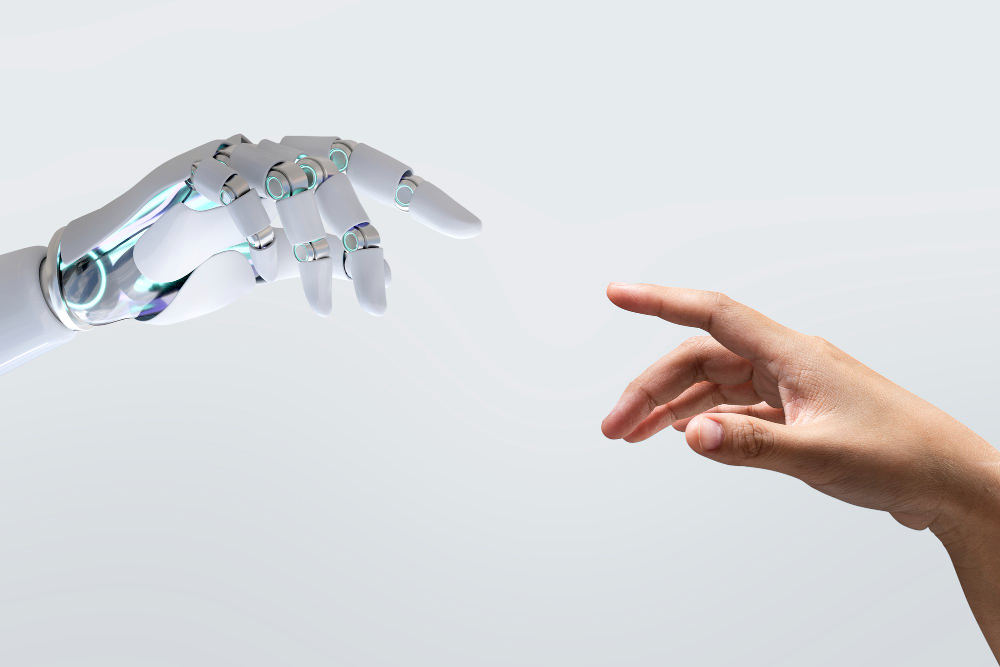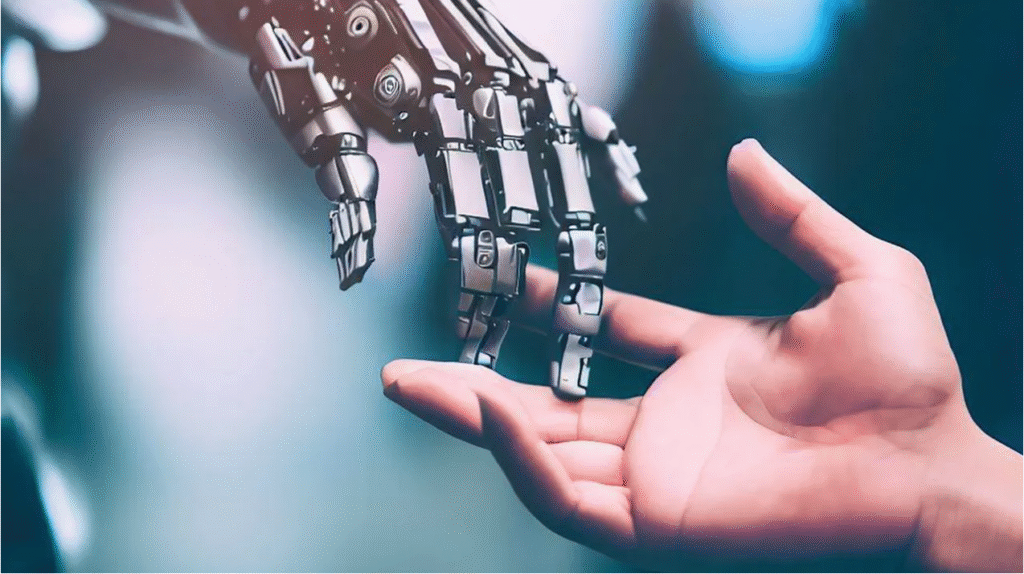The rise of artificial intelligence (AI) has sparked a wave of both excitement and fear across industries.
While some see AI as the next great innovation that will revolutionize business, others view it as a looming threat, poised to replace jobs and disrupt established industries. However, the truth is more nuanced than either of these extremes.
Artificial Intelligence is transforming the world of work, but it isn’t here to replace us — it’s here to work with us. And the professionals who view Artificial Intelligence as a collaborator, rather than a competitor, will find themselves not only surviving but thriving in the ever-evolving business landscape.
The AI Wake-Up Call: A New Era in the Workplace
The rapid development of Artificial Intelligence technologies has led to a significant shift in the workplace. Whether it’s in customer service, marketing, human resources, or operations, Artificial Intelligence is playing an increasingly important role in helping businesses operate more efficiently.
Automation tools are handling everything from data analysis and inventory management to chat support and customer interactions.
The challenge, however, lies in how businesses and professionals respond to this change. Just as the industrial revolution didn’t eliminate human labor but instead redefined it, Artificial Intelligence presents a similar opportunity.
The fear that Artificial Intelligence will make us obsolete stems largely from misunderstanding and resistance to change. In reality, Artificial Intelligence offers an opportunity for professionals to enhance their productivity, automate mundane tasks, and focus on higher-level, creative, and strategic work.
The real question is no longer if Artificial Intelligence will impact your job — it’s how you’ll respond when it does.
ALSO READ: AI Automation: 10 Smart Ways Startups Can Cut Costs Using AI Automation
What Does It Mean to Embrace AI?
To embrace AI doesn’t mean replacing humans with machines — it means using Artificial Intelligence to amplify human capabilities. Professionals who can work alongside Artificial Intelligence will find that the technology empowers them to do their jobs better, faster, and with greater precision.
It’s about seeing Artificial Intelligence as a partner rather than a competitor. Consider these examples:

- A salesperson who uses AI-powered tools to predict customer needs and tailor outreach can close deals faster and more effectively than those relying solely on traditional methods.
- A marketer who leverages Artificial Intelligence to analyze consumer behavior, track trends, and create targeted campaigns will have a distinct edge over others stuck in traditional marketing approaches.
- An HR manager who uses Artificial Intelligence driven recruitment software to screen resumes, analyze candidates, and match them with roles will dramatically reduce hiring time and increase the likelihood of successful placements.
In these cases, Artificial Intelligence doesn’t replace the professional but rather helps them make smarter, data-driven decisions. Artificial Intelligence amplifies their skills, making them more efficient and effective in their work.
AI and the Future of Work: Why Human Skills Matter More Than Ever
While Artificial Intelligence can handle tasks that involve repetitive work, heavy data processing, or pattern recognition, it cannot replace what makes us human. AI’s rise underscores the importance of human qualities that machines simply can’t replicate. These include:
- Critical Thinking and Problem Solving
Artificial Intelligence can analyze data and generate reports, but it cannot interpret complex situations and offer creative solutions. Humans excel at thinking outside the box, recognizing patterns in chaotic environments, and coming up with innovative solutions. In business, these skills are invaluable for navigating uncertainty and making strategic decisions. - Emotional Intelligence
Artificial Intelligence can simulate emotional responses, but it cannot truly empathize. Human connection is at the core of effective leadership, customer service, and team collaboration. A compassionate manager can inspire loyalty, resolve conflicts, and lead with emotional insight, qualities that Artificial Intelligence can’t replicate. - Creativity
Artificial Intelligence tools are adept at optimizing content, generating new ideas, or automating designs, but they lack the capacity for true creative thought. From advertising campaigns to product development, humans bring creativity to the table that Artificial Intelligence simply cannot generate on its own. The most innovative ideas often arise from a combination of intuition, experience, and imagination — qualities that Artificial Intelligence lacks. - Ethical Judgment and Social Responsibility
Artificial Intelligence can recommend actions based on data, but it is up to humans to make ethical decisions. For example, Artificial Intelligence might suggest hiring based on certain demographic characteristics, but it’s a human responsibility to ensure the hiring process is fair, unbiased, and aligned with organizational values.
In essence, while Artificial Intelligence can handle tasks and offer insights, it is humans who provide the judgment, creativity, and empathy that drive meaningful change and progress.
The Divide: AI Natives vs. AI Laggards
In the workplace of the future, there will be a clear distinction between those who embrace Artificial Intelligence and those who don’t. This divide will play a crucial role in shaping careers and business success.
- AI Natives: These are individuals who have adapted to the changing landscape and have incorporated Artificial Intelligence into their daily workflows. They use Artificial Intelligence tools to enhance their productivity and creativity, whether it’s automating administrative tasks, analyzing data, or improving customer interactions. AI natives are proactive about learning new Artificial Intelligence tools and integrating them into their work, staying ahead of the curve in terms of technological competency.
- AI Laggards: These are professionals who have resisted the shift toward Artificial Intelligence, either due to fear of automation or reluctance to learn new technologies. AI laggards continue to rely on traditional methods, often working harder and longer than their AI-savvy counterparts. They may fear that Artificial Intelligence will render their skills obsolete, but by resisting change, they are only making themselves more vulnerable to being outpaced by those who embrace Artificial Intelligence as an extension of their abilities.
The divide between AI natives and AI laggards will only grow as Artificial Intelligence becomes more integrated into business operations.
Those who avoid Artificial Intelligence will find themselves struggling to compete, while those who embrace it will become the leaders of the future.
People Also Read: AI Automation: 10 Smart Ways Startups Can Cut Costs Using AI Automation
How Artificial Intelligence Is Already Changing Key Industries
Artificial Intelligence’s impact isn’t just theoretical — it’s already transforming industries across the board. Here are some examples of how Artificial Intelligence is being used to revolutionize various sectors:
- Customer Support
Artificial Intelligence-powered chatbots and virtual assistants are already handling the majority of routine customer service queries.
These systems can respond to inquiries, troubleshoot issues, and guide customers through processes without the need for human intervention.
Also Read: The Role of Emotional Intelligence in Business: Why EQ Matters for Success
However, human agents are still needed for complex or sensitive issues that require empathy and deep knowledge. Artificial Intelligence helps reduce wait times and frees up human agents to focus on higher-level tasks.
- Recruitment and Hiring
Artificial Intelligence is transforming the way companies approach recruitment. Artificial Intelligence-powered tools can scan resumes, evaluate candidates’ skills, and even conduct initial interviews. By automating these processes, companies can make faster, more accurate hiring decisions. However, humans are still necessary to assess cultural fit and make final decisions, ensuring that the hiring process aligns with company values. - Marketing and Content Creation
Artificial Intelligence tools like content generation algorithms, predictive analytics, and personalization engines are helping marketers create more targeted campaigns. These tools analyze consumer behavior, predict trends, and generate content recommendations, helping businesses connect with customers in more meaningful ways. But it’s humans who add the creative touch and strategic thinking that make these campaigns resonate. - Supply Chain and Logistics
Artificial Intelligence is helping businesses optimize their supply chains by predicting demand, optimizing routes, and automating inventory management. By integrating Artificial Intelligence into logistics, companies can improve efficiency, reduce costs, and enhance customer satisfaction. - Human oversight is still required to ensure that AI’s recommendations align with broader business strategies.
The Future-Proof Professional: How to Stay Relevant in the Age of Artificial Intelligence
As Artificial Intelligence continues to evolve, professionals must adapt to remain relevant. Here are some actionable steps to future-proof your career:
- Embrace Lifelong Learning
The pace of technological change is faster than ever before. To stay ahead, commit to continuous learning. Take courses on Artificial Intelligence, data analytics, and other relevant technologies. Platforms like Coursera, Udemy, and LinkedIn Learning offer a wealth of resources that can help you develop new skills and stay updated. - Master AI Tools
Learn how to use Artificial Intelligence powered tools in your field. Whether it’s automating your email responses, analyzing sales data, or generating content ideas, mastering Artificial Intelligence tools will give you a significant edge over your peers. - Focus on Soft Skills
While Artificial Intelligence can handle tasks, it can’t replicate human qualities like empathy, creativity, and judgment. Focus on developing your emotional intelligence, leadership abilities, and creative problem-solving skills — these are the qualities that will make you irreplaceable. - Collaborate with AI
View Artificial Intelligence as a tool that can enhance your capabilities, not a threat. Use it to automate repetitive tasks, analyze data, and generate insights. By collaborating with Artificial Intelligence, you’ll free up time to focus on high-value tasks that require human expertise.
Conclusion: Embrace AI, Don’t Fear It
Artificial Intelligence is not a harbinger of job loss but a tool for professional empowerment. Those who embrace Artificial Intelligence as a collaborator will not only remain relevant in the workforce, they will thrive. By leveraging Artificial Intelligence to enhance their work, professionals can focus on what they do best: creating, leading, and innovating.
The future belongs to the AI-savvy professional, one who sees Artificial Intelligence as an extension of their abilities, not a threat to their existence. Don’t compete with Artificial Intelligence, collaborate with it, and you’ll find that the possibilities are limitless.



2 Comments
Pingback: AI Automation: 10 Smart Ways Startups Can Cut Costs Using AI Automation - Magic Media
Pingback: 5 Untapped Business Opportunities in Nigeria That Will Soon Be in High Demand - Magic Media